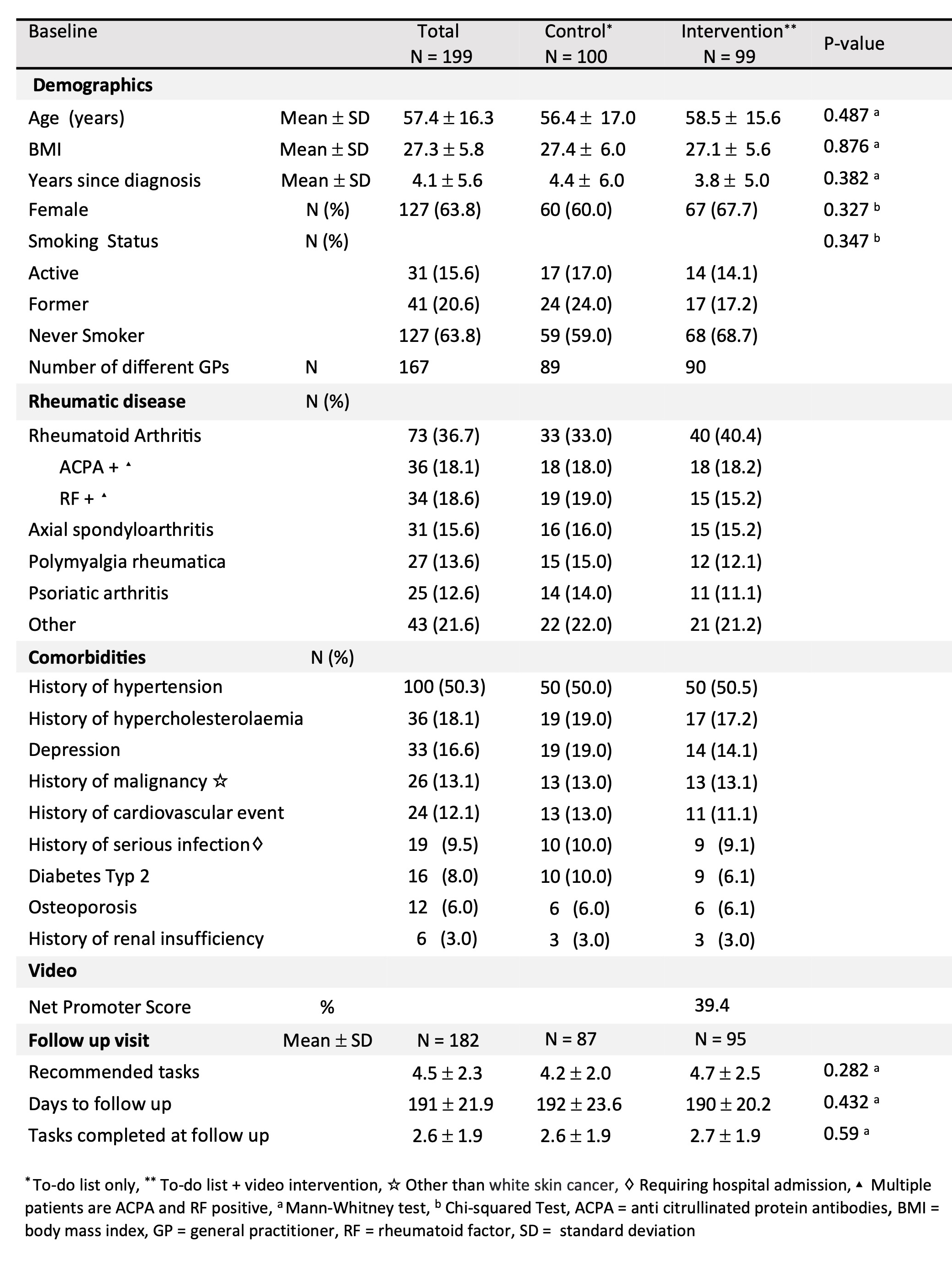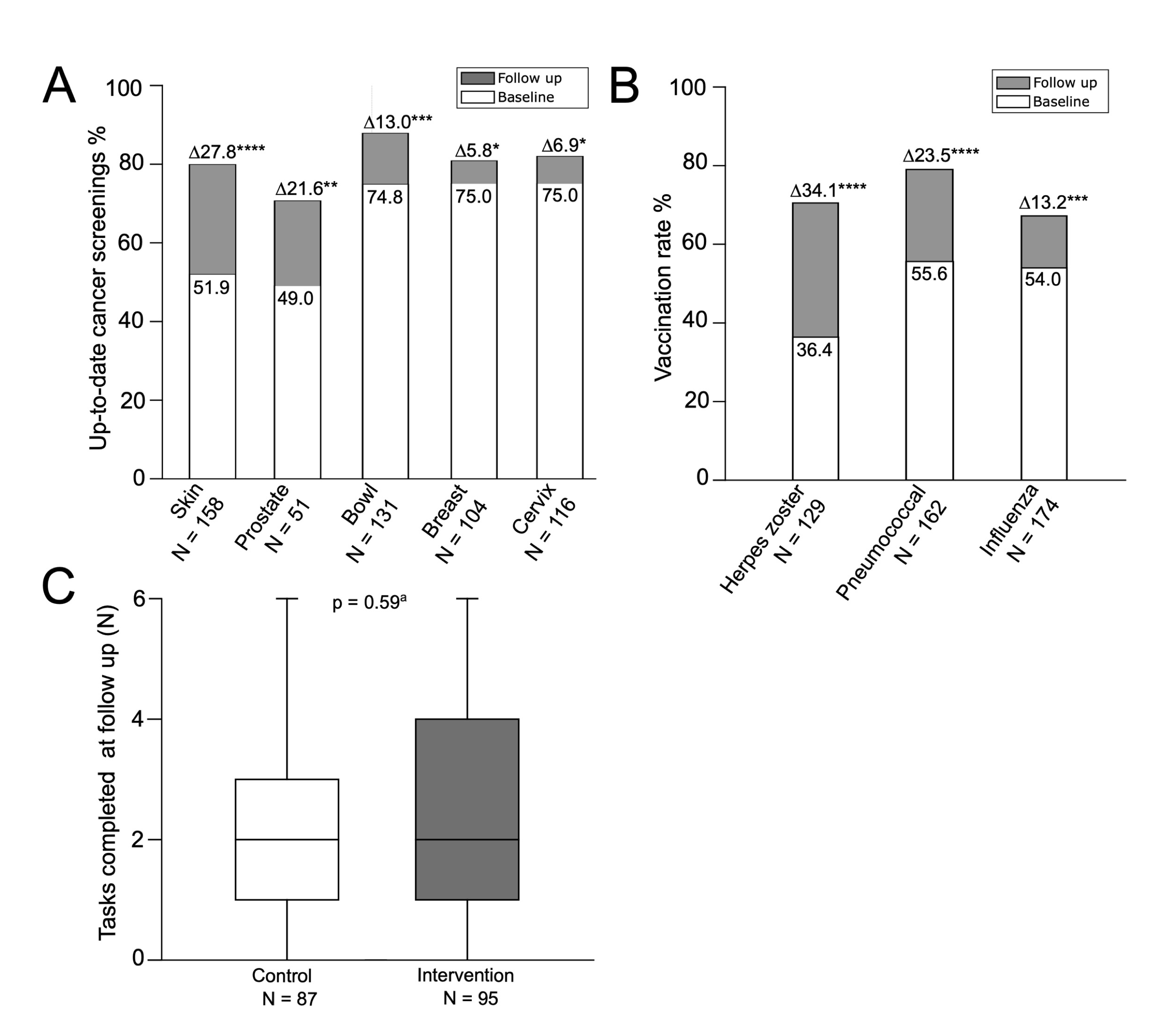Session Information
Session Type: Poster Session B
Session Time: 10:30AM-12:30PM
Background/Purpose: Patients with inflammatory rheumatic diseases (IRDs) are at higher risk for malignancies and infections. Effective management strategies for these comorbidities are urgently needed. We hypothesize that a physician-created educational video will enhance patient adherence to preventive health measures.
Methods: The prospective KOMO-R study recruited outpatients with rheumatic diseases from the rheumatology department at Klinikum Nürnberg. Participants were randomly assigned to either an intervention group or a control group. The intervention group received an educational video about rheumatic disease comorbidities and a to-do list with recommended actions based on local preventive health care guidelines. The control group received only the to-do list. Baseline evaluations included assessments of comorbidities, vaccination status and adherence to cancer screening.
Results: Of the 200 enrolled patients with inflammatory rheumatic diseases (IRDs) (see Table 1 for detailed distribution), 182 had complete data sets. Participant demographics showed no significant differences in age (57.4 ± 16.3 years) and weight (BMI 27.3 ± 5.8 kg/m²), with 63.8% being female. Active smokers comprised 15.6% of the participants, while former smokers accounted for 20.6%. The participants consulted 167 different general practitioners. The average disease duration was 4.1 ± 5.6 years. Both cohorts had similar comorbidity rates ranging from hypertension (50.3% of patients) to renal insufficiency (3.0%) (for other comorbidities, see Table 1).
The intervention group rated the educational video with a Net Promoter Score of 39.4%, and an average score of 9.1 ± 1.4 on a visual analogue scale for informativeness/helpfulness (0 = not, 10 = very). The follow-up visit occurred after 191 ± 21.9 days. The main analysis showed no significant difference in completed tasks between the video group and the to-do list only group (Fig. 1C). However, adherence to all preventive health measures significantly increased across the cohorts compared to baseline (Fig. 1A,B). At follow-up, 79.7% of patients were up-to-date with skin cancer screening, a 27.8% increase from baseline (51.9%). Furthermore an increase in Prostate cancer screening (49.0% to 70.6%), Gynecological cancer screening (75% to 81.9% (cervical), 80.8% (breast)) and Bowel cancer screening (74.8% to 87.8%) was detected. (Fig. 1A). Vaccination rates for pneumococcus and influenza increased from 55.6% and 54.0% to 79.0% and 67.2%, respectively. Shingles vaccination rates almost doubled from 36.4% to 70.5% (Fig. 1B).
Conclusion: The educational video did not significantly affect the number of tasks completed from the to-do lists. However, both the to-do lists alone and in combination with the video significantly improved adherence with preventive healthcare services. These findings underscore the potential of patient empowerment strategies to modify behavior and positively impact health outcomes.
screening adherence versus adherence at follow up for the cohort that completed the follow up appointment B Baseline vaccination rates versus rates at follow up for the cohort that completed the follow up appointment C Comparison of the number of tasks completed from the To-Do lists between the control and intervention groups. VAS = Visual Analogue Scale. * p-value < 0.05, ** p-value < 0.01, *** p-value < 0.001, **** p-value < 0.0001 for McNemar's test on paired nominal data, a Mann-Whitney test.
To cite this abstract in AMA style:
Bartsch V, Habboub B, Standfest K, Knitza J, Schett G, Hueber A. Innovative Patient Empowerment: Evaluating the Effect of a Physician-created Educational Video and To-do Lists on Promoting Preventive Health Measures in Rheumatic Disease Patients [abstract]. Arthritis Rheumatol. 2024; 76 (suppl 9). https://acrabstracts.org/abstract/innovative-patient-empowerment-evaluating-the-effect-of-a-physician-created-educational-video-and-to-do-lists-on-promoting-preventive-health-measures-in-rheumatic-disease-patients/. Accessed .« Back to ACR Convergence 2024
ACR Meeting Abstracts - https://acrabstracts.org/abstract/innovative-patient-empowerment-evaluating-the-effect-of-a-physician-created-educational-video-and-to-do-lists-on-promoting-preventive-health-measures-in-rheumatic-disease-patients/


